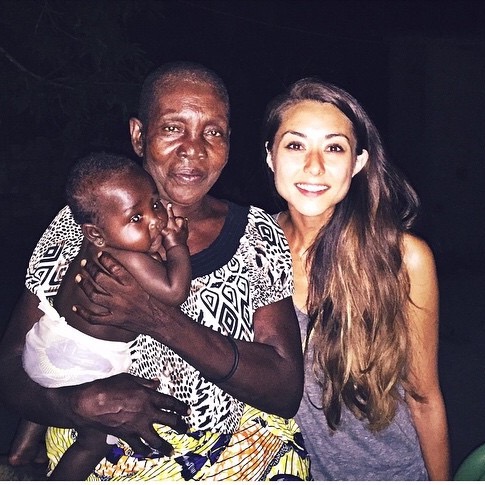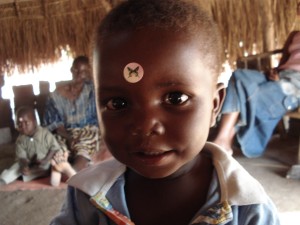A story can change the world.
If you’ve been on the lookout for a good read lately, we’ve got you covered. This week, our staff has been glued to an incredible new book called Mama Koko and the Hundred Gunmen by Lisa Shannon and Francisca Thelin. It’s a compelling true story about a Congolese woman whose family was caught in the middle of one of the LRA’s most brutal massacres in the Democratic Republic of Congo.
The story of the LRA conflict is so important to tell, and we love how these authors captured Mama Koko’s experience so beautifully and powerfully. We asked co-author Lisa Shannon if she’d do us the honor of contributing a guest blog. Here’s the story she shared with us. Get your tissues ready.

Mama Koko (left) with Lisa Dougan, our Director of Central African Programs (right). “Even though she has survived the worst evils you can imagine, she still embodies more grace, strength and resilience than you can believe,” Lisa said.
For Heritier: The Invisible Child Behind Mama Koko and the Hundred Gunmen (By: Lisa Shannon)
The first time I met 1-year-old Heritier, I found him laying on a floor mat wedged between rusty hospital beds, alone. Instinctually, I scooped him off the hospital floor into my arms. He rested his small head on my shoulder, his weight sinking down into my veins. Heritier was to become my invisible child, a child living in Kony’s shadow. One I would ultimately fail.
In 2010 I traveled to Dungu in northern Congo to research a new book, Mama Koko and the Hundred Gunmen, with my neighbor and Orientale Province native, Francisca Thelin. We were meant to stay with Francisca’s mom, in her traditional mud and thatch compound, but a week before we arrived, news of an attack in town broke – only one mile from Mama Koko’s place. Kony’s gunmen had walked into town, past the United Nations base, past the Congolese army, and into a quiet pocket of huts and gardens and cooking fires, peppered with children and grandmas.
They opened fire.
When we arrived in Dungu, Francisca and I learned what happened to her cousin Antoinette that day: She grabbed her baby boy Heritier and ran when she saw the dreadlocked men in trenchcoats. A bullet caught her and she collapsed, but she managed to drag herself and her child to the bushes.
Though Heritier’s father was present for the attack, though he might have helped, witnesses said he pushed Heritier’s older brother, 4-year-old brother Herbert, into the path of the LRA, jumped on a bike, and rode to safety by himself.
That night, Antoinette bled to death, grasping her baby boy. Heritier was found the next morning cradled by her dead body, still nursing.
We tracked Heritier down at the hospital. He was sweet-faced, but with grief-stoned eyes, drained from his night in the cold, refusing to rally. When he collapsed his little head on my shoulder, I was sunk. Without logic, I vowed to do all I could to help love my new little friend back to life.
We played with stickers, cuddled in the sunny hospital courtyard, I shared postcards of flowers with him, triggering our first shared smiles. Before long, I was combing the markets for new clothes and toy rattles. Once he came home from the hospital, I stole him away for long afternoons of cat videos, songs, and pineapple snacks. When someone asked him if I was his new Mama, he nodded and said yes.
I turned 35 while in Dungu, and dreamed of adopting him, though I knew it could never be: He had a dad (albeit unfit), an extended family that loved him, and I was a flat-broke activist. I shifted to asking after a Godmother role, brainstorming ways I could support him and his brothers from afar.
But like so many bursts of inspiration, those secret moments we ask ourselves maybe I could do something, my brainstorm was followed by inspiration’s inevitable wake– doubt. Church leaders wouldn’t support a Godparent set up. Francisca assured me there was little I could do, since even she had trouble getting support to her family in Dungu. And I’d heard the same criticisms leveled on every American or white person trying to intervene in Africa: It’s not your place. Oh brother, here’s another white savior. It’s really all about press or pocket book or profile.
As we know all too well, Invisible Children served as a lightening rod for this type of tension in the backlash for Kony 2012.
I could have pushed through that discomfort and problem solved, partnered with locals in Dungu to get Heritier the support he needed. But I listened to the mumbles about going to far. In the fear of overstepping, I backed off. He stayed with his father. I let it go.
Two years after meeting with Heritier, the same week the world echoed with meta-debates over Kony 2012—Is this a worthy cause? Who’s ego is too big? Is Kony even a threat?—little Heritier died.
Underneath the white-noise of armchair cynics, the all-too-real fear of LRA attacks kept people from farming those years, which drove up food prices. Heritier grew malnourished and developed anemia, which was treated far too late.
That beautiful little boy didn’t need to die. Yes, thoughtful interventions always need to focus on listening, partnership, and building local capacity. But I’ve learned despite the buzz about “savior complexes,” there is no harsher form of racism than shrugging off our own responsibility and watching people die.
Nothing can make up for the loss of precious Heritier. All the same, I dedicated the new book to him. Mama Koko and the Hundred Gunmen is a story not just about suffering and violence at the hands of the LRA, but the intimate, beautiful family epic that spans more than 70 years, celebrating the best of what Francisca calls “the real Congo.” I wrote it because I don’t know how can we fully understand the violence if we don’t understand what—or who—has been lost.
Heritier’s sparkling, smiling face stared at me from my desk as I wrote, a constant reminder of the lives at stake. I vowed as I wrote that the fears and doubts—Who me? It’s not my place! —will never again drown out my own capacity to love, empathize and engage.
To honor him, I look forward to steering readers, media, and policy makers toward concrete actions we can take to help bring peace and rebuild the region: Build long-term capacity for Congolese management of Invisible Children’s Early Warning Network. Support the “Come Home” defection program to disband remaining LRA fighters. Urge Congress to appropriate an additional $10 million dollars to help rebuild Orientale Province, so families like Francisca’s can get back to living joyful, sustainable lives. So all the invisible Heritier’s have a chance to grow up in the real Congo, where they are raised as the country’s most precious treasure.
####
Writer and activist Lisa Shannon is author of the new book Mama Koko and the Hundred Gunmen, on LRA affected Congo, as well as the book A Thousand Sisters. She is founder of Run for Congo Women, and an Associate of the Carr Center for Human Rights at Harvard.

Think people should hear about this?